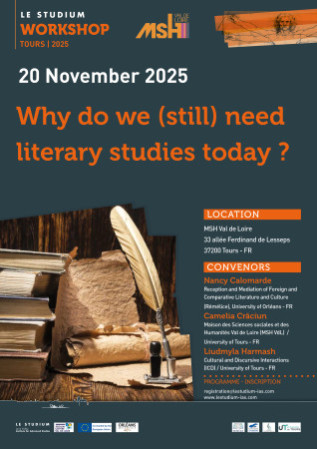Nancy Calomarde

From
Faculty of Philosophy and Humanities. National University of Córdoba - AR
In residence at
Reception and Mediation of Foreign and Comparative Literature and Culture (Rémélice), University of Orléans - FR
Host scientist
Marcos Eymar
BIOGRAPHY
Nancy Calomarde holds a PhD in Literature from the National University of Córdoba (UNC). She is the author of several books, including Políticas y ficciones en Sur (1945–1955) (2004), El diálogo oblicuo (2010; 2016), and Un destino sudamericano. Barroquismo y archivo plástico en la ficción de Virgilio Piñera (forthcoming, 2025). She has also edited and coordinated numerous collective volumes, such as Territorialidades latinoamericanas (2021); Lezama Lima: Orígenes, revolución y después and Escrituras Latinoamericanas. Literatura, teoría y crítica en debate (both in 2013, with co-editors); Devenir/Escribir Cuba en el siglo XXI (2019); and Ficciones críticas (2021).
Her research, published in scientific journals and collective volumes, focuses primarily on Latin American literature, with particular attention to Cuban literary production. She currently leads a Research Program on Latin American literary criticism and directs the project Latin American territorialities in worlds to come: poetics of re-landscape and re-beginnings in the heterogeneous assemblages of contemporary literature and art (2023–2026, SECYT-CIFFyH).
At UNC, she is Full Professor of Latin American Literature I and II in the School of Letters, Faculty of Philosophy and Humanities. She has also been invited as Visiting Professor at the University of Texas (USA) and Leiden University (Netherlands).
PROJECT
The deterritorialized transavant-garde of Latin America in the second half of the 20th century
Various recent studies have shown interest in thinking about the Latin American literary avant-garde from new paradigms. Among them, its potential to reflect on the end of literature or its post-utopian potential. This revisitation shows two fundamental issues: 1. the power of the notion of avant-garde to question aspects of contemporary politics and aesthetics and 2. the need to reevaluate the bases of Latin American literary criticism - creator of a continental canon still current - to postulate other modes of approach that make visible the vicissitudes or avant-garde movements of the second half of the 20th century as signs of a culture to come: deterritorialized, migrant and post-utopian. In line with recent works, I propose to study Latin American migrant writings - such as those of the Cuban Virgilio Piñera, the Mexican Elena Garro and the Uruguayan Cristina Peri Rossi. This heterogeneous corpus not only (as far as I have been able to investigate) has not been studied as “avant-garde” or put into dialogue, but, in its corpus form, it eludes the generational criterion and requires, for its understanding, transhistorical and dynamic notions, like the one that articulates and gives title to this study (transvanguardia). Two aspects, in my opinion fundamental, give even greater relevance and relevance to this research: 1. the power of these avant-garde avatars to challenge the futures of literature and 2. the aesthetic modulations of genre that these writings propose (especially in the work by Garro and Peri Rossi) where the body-text challenges the homogeneous matrices of Latin American Modernity
Regarding the relevance of this study with the main lines of the Remelice laboratory, it is worth highlighting: Migratext project can contribute to this project and draw on its findings in terms of expanding the study corpus and the theoretical-methodological discussion around the relationships between aesthetics and migration; the studies on insularism carried out in the laboratory can contribute fundamentally since Virgilio Piñera developed extensive poetics around the issue.
This project aims to hold an International Conference (avant-garde and migration)
TESTIMONY

